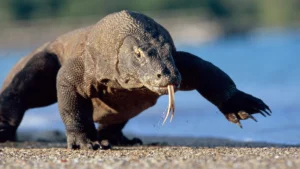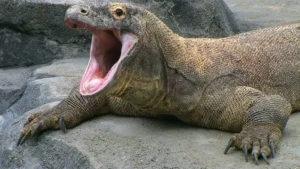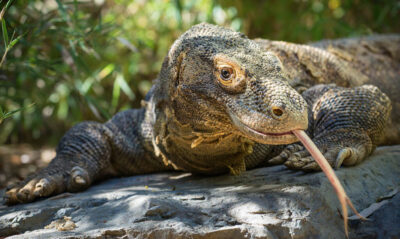The Komodo dragon, a majestic and fearsome creature, evokes images of prehistoric times and untamed wilderness. With its impressive size, formidable strength, and unique biology, the Komodo dragon is undoubtedly a captivating species. But amidst the allure of owning exotic pets, one question arises: Can you own a Komodo dragon?
Owning a Komodo dragon is a complex matter that varies greatly depending on jurisdiction and regulations. In some places, it may be legal with proper permits and licenses, while in others, it could be strictly prohibited due to concerns about conservation, public safety, and animal welfare.
Additionally, the practicality of owning such a large and specialized reptile raises significant challenges in terms of housing, care, and expertise required to ensure its well-being. Therefore, while it may be theoretically possible to own a Komodo dragon in certain circumstances, it’s crucial to thoroughly research and understand the legal and ethical implications before considering such an endeavor.
Can you own a komodo dragon?

No, it’s generally not legal or practical for individuals to own Komodo dragons. They are protected species, and their ownership is tightly regulated due to their endangered status and the potential danger they pose to humans.
Komodo dragons are large, powerful reptiles native to a few Indonesian islands. Due to their size, strength, and predatory nature, they can be dangerous to humans and other animals. Consequently, many countries have strict regulations regarding their ownership and trade to ensure their conservation and to protect public safety.
Firstly, Komodo dragons are listed as vulnerable or endangered species, primarily due to habitat loss, poaching, and conflicts with humans. This means that owning them may be illegal in many places without proper permits or licenses.
Secondly, Komodo dragons require specialized care and environments. They need large enclosures with specific temperature and humidity levels, as well as access to suitable food sources, which often include live prey. Maintaining such an environment can be complex and expensive, requiring significant resources and expertise.
Furthermore, Komodo dragons have powerful jaws and sharp teeth, capable of delivering venomous bites. While attacks on humans are rare, they can occur, especially if the dragon feels threatened or if it mistakes a human for prey. Therefore, allowing private individuals to own Komodo dragons could pose risks to both owners and the public.
Overall, due to their protected status, specialized care requirements, and potential danger, owning a Komodo dragon is generally not feasible or advisable for most people. Conservation efforts focus on protecting these magnificent creatures in their natural habitats and in accredited zoos or wildlife sanctuaries where they can be properly cared for and studied.
Laws and regulations regarding exotic pet ownership
Laws and regulations regarding the ownership of exotic pets vary widely depending on the country, state or province, and even local municipality. Here are some general principles and considerations:
- Protected Species: Many countries have regulations that prohibit or restrict the ownership of certain exotic animals, especially those listed as endangered or threatened species by international conservation organizations like the Convention on International Trade in Endangered Species of Wild Fauna and Flora (CITES). Examples of such animals might include big cats, primates, certain reptiles, and birds of prey.
- Permits and Licenses: Some jurisdictions require permits or licenses for owning exotic pets. These permits often come with specific requirements regarding the care, housing, and safety of the animal. Owners may need to demonstrate that they have appropriate facilities and knowledge to care for the animal properly.
- Public Safety: Regulations may also be in place to protect public safety. This can include restrictions on owning animals with a history of attacks on humans or those deemed inherently dangerous due to their size, strength, or venomous nature.
- Health Concerns: Exotic pets can sometimes carry diseases that can be transmitted to humans or domestic animals. Regulations may include requirements for health screenings, vaccinations, or quarantine periods for imported animals.
- Welfare Considerations: Many jurisdictions have laws aimed at protecting the welfare of animals, including exotic pets. These laws may specify minimum standards for housing, diet, veterinary care, and socialization.
- Enforcement: Enforcement of exotic pet regulations can vary. Some areas may have dedicated agencies or departments responsible for overseeing exotic pet ownership, while in others, enforcement may fall to animal control or law enforcement agencies.
It’s crucial for individuals considering owning an exotic pet to research and understand the laws and regulations in their area thoroughly. Failure to comply with these regulations can result in legal consequences, confiscation of the animal, and harm to both the owner and the animal.
Additionally, prospective owners should carefully consider the ethical implications of keeping exotic pets and ensure they can provide appropriate care for the animal’s entire lifespan.
Challenges of komodo dragon Ownership

Owning a Komodo dragon presents numerous challenges, both practical and ethical:
- Legal Restrictions: Many countries have strict regulations on owning Komodo dragons due to their endangered status and potential danger to humans. Obtaining the necessary permits and meeting regulatory requirements can be challenging and may even be prohibited in some areas.
- Specialized Care: Komodo dragons have specific habitat and dietary requirements. They need large enclosures with high humidity and temperature gradients to mimic their natural environment. Providing proper care involves significant expertise and resources.
- Space Requirements: Komodo dragons are large, active reptiles that require ample space to roam and exercise. Constructing and maintaining a suitable enclosure can be expensive and may not be feasible for many individuals.
- Diet: Komodo dragons are carnivorous and require a diet of whole prey, including small mammals, birds, and occasionally larger animals. Sourcing and providing appropriate food can be challenging and may require feeding live prey, which raises ethical concerns.
- Health and Veterinary Care: Komodo dragons can suffer from various health issues, including metabolic bone disease, respiratory infections, and parasitic infestations. Finding a veterinarian with expertise in reptile medicine and providing proper medical care can be difficult.
- Safety Concerns: Komodo dragons are powerful predators with sharp teeth and claws. Handling them can be dangerous, and they may pose a risk of injury or even death, especially if they feel threatened or stressed.
- Longevity: Komodo dragons have long lifespans, often exceeding 20 years in captivity. Committing to care for an animal of this size and lifespan is a significant responsibility and requires careful consideration of long-term planning and resources.
- Ethical Considerations: Keeping a Komodo dragon as a pet raises ethical questions about the welfare of the animal. These animals are wild creatures with complex behavioral and social needs that may not be met in captivity. Additionally, removing individuals from the wild can further endanger wild populations.
Overall, while owning a Komodo dragon may be appealing to some, the challenges and responsibilities involved make it impractical and often unethical for most individuals. Conservation efforts and responsible management of wild populations are crucial for the long-term survival of these magnificent reptiles.
Safety concerns for both owner and public
Safety concerns regarding owning a Komodo dragon revolve around the potential dangers posed by their size, strength, and predatory instincts. Here are some safety considerations for both the owner and the public:
- Physical Danger: Komodo dragons are large and powerful reptiles capable of causing serious injury or even death with their sharp teeth and claws. Handling them without proper training and equipment can result in bites, scratches, or crushing injuries.
- Aggressive Behavior: While Komodo dragons are generally shy and reclusive in the wild, they can become aggressive when threatened or provoked. Owners need to understand their behavior and body language to prevent situations that may lead to aggression.
- Escape Risk: Komodo dragons are strong and agile climbers and diggers, making them capable of escaping from poorly secured enclosures. Escaped Komodo dragons pose a significant risk to public safety, as encounters with humans or domestic animals can result in injury.
- Zoonotic Diseases: Like all animals, Komodo dragons can carry diseases that may be transmissible to humans (zoonoses), such as Salmonella bacteria. Proper hygiene and handling practices are essential to reduce the risk of disease transmission.
- Public Safety: Keeping a Komodo dragon in a residential area or anywhere accessible to the public can pose risks to neighbors, passersby, and emergency responders. Even if the owner takes precautions, there is always the potential for accidents or escapes that could endanger others.
- Legal Liability: Owners of exotic pets, including Komodo dragons, may face legal liability if their animal injures someone or damages property. In some jurisdictions, owners can be held responsible for any harm caused by their pet, regardless of whether they were negligent.
- Educational Outreach: Educating the public about Komodo dragons and their behavior can help mitigate safety concerns. Providing information about their natural history, proper handling techniques, and safety precautions can reduce the likelihood of accidents and misunderstandings.
Given these safety concerns, it’s essential for anyone considering owning a Komodo dragon or any other exotic animal to thoroughly research the legal requirements, safety protocols, and ethical considerations involved.
In addition, responsible ownership requires a commitment to providing proper care, ensuring public safety, and promoting the welfare of the animal.
Conclusion
From legal restrictions to safety risks for both owners and the public, the ownership of these magnificent reptiles is generally impractical and often unethical. Considering their specialized care needs, potential dangers, and conservation status, it’s clear that Komodo dragons are best appreciated in their natural habitats or in accredited zoos where they can receive proper care and contribute to conservation efforts.
Therefore, the answer to the question “Can you own a Komodo dragon?” is fraught with complexities, emphasizing the importance of responsible stewardship and respect for wildlife.

